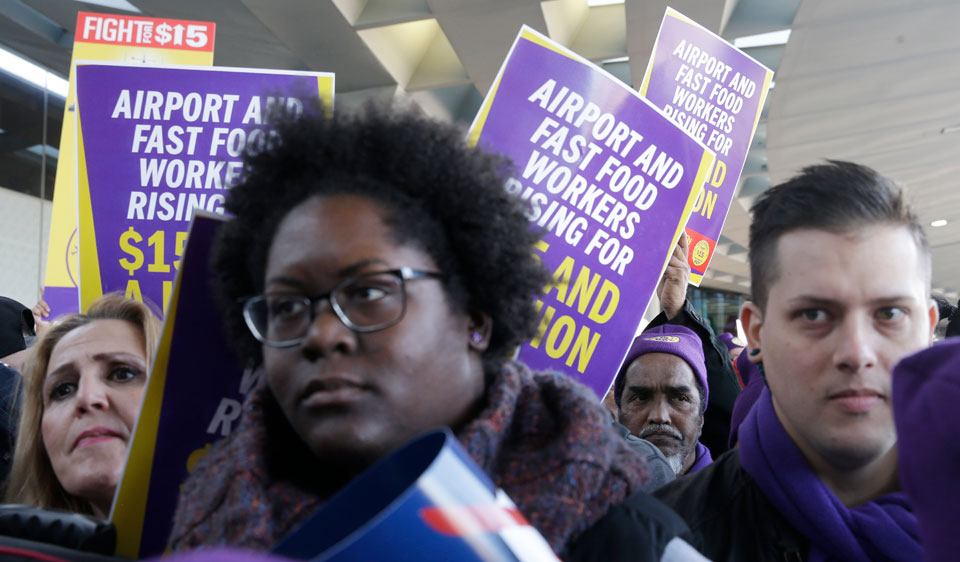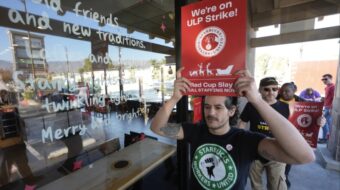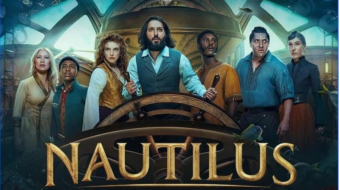
The following editorial was published by Press Associates Union News Service.
AFL-CIO President Richard Trumka often cites a Harvard University study of millennials which found that only 30% say democracy is important. He repeated that at his annual Labor Day evaluation with reporters—but linked them to something larger, much larger: Questioning the whole capitalist system.
“All they’ve ever seen is wages going down, pensions and health care taken away,” he said. “They’re told ‘Go to school and you’ll be OK,’” referring to the supposed truism that a college diploma leads to a career and financial security. “But they come out with a mountain of debt and starting to believe capitalism equals low wages, no health care, and high poverty.”
“And then along comes Donald Trump and he says ‘I’m going to change the rules,’” so millions voted for the Republican—who, Trumka often says, only made a bad situation worse.
But here’s the basic point, which several of the Democratic presidential hopefuls enunciate so well, as does Trumka in other speeches: The capitalist system is rigged.
And it’s not just rigged against the millennials, who have the most doubts. It’s rigged against all of us outside the 1%.
And we know who rigs it, too: Corporate chieftains who use their mountains of money—garnered off of our sweat and toil—to literally buy companies and lives. And politicians.
That tells us the millennials are on to something. Maybe their elders are catching on, too. Or the elders know it, but won’t admit it. Warren Buffett knows: He says his class is winning, and that, he adds, is not good, for the capitalist system or the country.
It’s not just Donald Trump. The whole capitalist system, which the U.S. irrevocably chose, it seems, even before it became a country, is built on the backs of the many for the benefit of the few. And those few leech off the rest of us. What do they do to deserve the mountains of cash, stock, profits, and bonuses they garner? Our answer: Zero, zip, nada.
As Trumka often says, we—workers—built this country, its roads, its railroads, its homes, its schools, its airplanes, its factories, its technology, its farms. He won’t go as far as we will to the logical conclusion to his thought: We not only deserve but are entitled to all the fruits of our labors and the profits of our toil—and to determine how to run the show.
In short, to take over the economy from the corporate criminals and Wall Street wolves who exploit our lives for their benefit. Heck, we’d do a better job than they do, and a fairer one.
Some readers will recoil and call that “radical” or “Socialist” or “Communist,” and wave the tattered banner of anarchy and rebellion. “Horrors! We must preserve order!” a few orate. Order for whom? They won’t say. But it’s order for the elite and their political puppets, not us.
So maybe it’s time to follow the millennials’ lead and really start questioning not just aspects of the U.S. system, but the very nature of the system itself.
Why should those who contribute nothing get everything while those who build the country get crumbs from the plutocrats’ table?
“The tree of liberty only grows when watered by the blood of tyrants” is a quote usually, and incorrectly, attributed to Thomas Jefferson. The real author was a French revolutionist.
We would argue tyranny comes from corporate suites more often, more pervasively, and more perniciously than from politics, for tyranny is part of the capitalist system. So maybe it’s time to start thinking of how to chop down that tyranny to water our tree—the tree of workers’ liberty.










